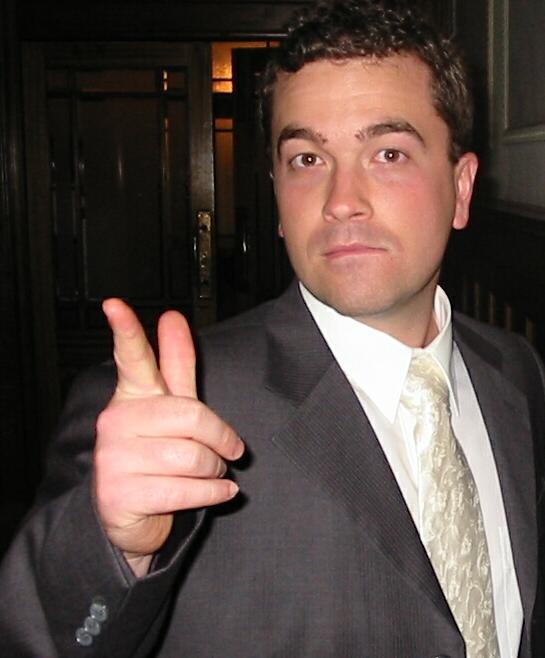First of all, we can say that it matters who you are online.

We cannot say that our online relationships are of no consequence simply because they are not done in the flesh. Whenever we communicate we are engaging in a fundamental human activity, so the usual courtesies placed on face to face interaction should also apply to communication done digitally.
All communication involves an interaction between two beings at some level, be it through typed text or via the actions and words of a Second Life avatar. And as we are creatures who respond to and formed by all types of communication (a quick read through the Book of Proverbs bears testimony to this), it’s hard to see online relating as some kind of neutral zone where there are no consequences. Scripture exhorts us not to conform “to the pattern of this world” but “to be transformed by the renewing of [our] minds” (Rom 12.2). Developing the habit of conforming to the world while being online is hardly going to help us grow to the stage where we can “test and approve what God’s will is”.
We could also argue (although I feel a little tentative about it) that even though we might be relating through a fictitious avatar, we are still operating as the image of God. It seems to me that a digitally created human still carries some semblance of the divine relational image; it still represents the kind of relationships which constitute the image of God in the physical world. The animated avatar might be an image of an image, but it is still an image. This raises all sorts of questions about how humans are depicted within different art forms. Is a degrading photo of a human being a blasphemy against the image of God? Quite possibly. So can an avatar who acts in disrespectful ways also be seen to be a blasphemy against the divine image? I think it could be (I’d be interested to see what people think of this idea).
So what steps can we take to make sure our online personae are respecting the image of God and helping others to grow in godliness? The anonymity created by online communication can act as a cover under which we can be tempted to pursue unhelpful patterns of relating. In response to this a friend of mine has determined to never use an online pseudonym; he always identifies himself so that people always know exactly who he is. He finds this an easy way to keep himself accountable, and it nips any temptation to act unhelpfully in the bud. Simple and effective.
But as we have already said, human life is more than just relating to one another, it’s also an embodied life…

11 comments:
marty,
where can i listen to your talks online???
Sam
Heya Sam!
Ummm, the St Matt's WPH youth site have the TMF talks from last year, other than that the cherrybrook anglican church site have talks from a few years ago...but you will need to trawl through the archives.
It will be great to see you soon. Are you around at Easter? I'll come up.
Yeah... we're not around over the long weekend but we'll be around for all of your holidays. Be awesome if you could come up for a few nights!!
Adios
Sam
Does this mean I can no longer pose as Candice 21 year old female from California???? Bummer!
Seriously...
Is a degrading photo of a human being a blasphemy against the image of God? Quite possibly. So can an avatar who acts in disrespectful ways also be seen to be a blasphemy against the divine image? I think it could be
I think I'd agree on both counts.
In response to this a friend of mine has determined to never use an online pseudonym; he always identifies himself so that people always know exactly who he is.
i made that a similar decision more than 5 years ago. i think it's a good thing.
hey marty - it was good to catch you the other night (i have some fun pictures from the night on my blog)
I think I agree about the degrading photo (though what counts as such is obviously open to interpretation and contestation) and avatar use. As for never using a pseudonym, I agree in principle, though there may be specific contexts in which it is understood that you are playing a role (e.g. actors in a play or film) and I have no problem with such fictions.
Re: anonymity
there are other contexts where pseudonymity may be very appropriate. for two very different examples: an online support group for survivors of rape; persecuted christians using the internet to gain encouragement they could not access in their embodied lives.
anonymity itself is not vicious, which is one reason why the 'If you've got nothing to hide, then you've got nothing to be afraid of' argument is so poor. I oppose the presumption that people shouldn't be anonymous, or worse - should have their lives monitored, insofar as the grounds for that is that anonymity enables vice. Not because it doesn't, but because it doesn't necessarily.
but what about being anon when you really don't have anything interesting to say but feel you have to say it anyway?
is this a bit like an image bearer hiding in the garden- fearing their shame might be exposed? wanting to be known yet fearing the same?
why do you wear clothes Martyn Kemp?
I think I know why
This article I read a while ago is a helpful exploration of some of the issues Seumas raised of privacy and anonymity:
http://www.wired.com/politics/security/commentary/securitymatters/2006/05/70886
Its only a summary but i think the guy has a book out.
Hi Marty,
Have you read this article?
http://www.episcopal-life.org/81827_93353_ENG_HTM.htm
Post a Comment